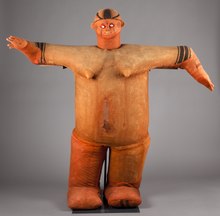Bwende people


The Bwende people (also Babwende, Bweende, Buende, Babuende) are a Bantu ethnic group which inhabit a region across the borders of the Democratic Republic of the Congo and Republic of the Congo.[1] They mainly inhabit the area north of the Congo river, between the rivers Luala and Kenke.[2] They speak Bwende, a Bantu language related to Kikongo and were a part of the Kongo Kingdom.[3][2]
Art
[edit]Statuettes
[edit]The artistic expression of the Bwende has been strongly influenced by the Beembe, their neighbors to the northwest. However, the Bwende statuettes have some specific characteristics, such as broad shoulders, numerous body scarifications and a hairstyle that is sometimes asymmetrical.[4] Wooden statuette with scrap metal inserts were used in the nkisi cult. These fetishes are considered to be very powerful: they are asked to identify a culprit as well as to cure an illness.
Niombo
[edit]The Bwende are famous for their large fabric funerary mannequins (niombo), in reality desiccated corpses swaddled in many layers of cloth.[2] They are rarely seen in Western collections. However, in the Museum of World Culture in Gothenburg there is an impressive niombo, famous for its height, scope and reddish color. This was on display at the Eternal Ancestors: The Art of the Central African Reliquary exhibition held at the Metropolitan Museum. of Art in 2007.[5][6][3] It was produced at the beginning of the 20th century in a Swedish mission in the Lower Congo.
Muzidi or Muziri
[edit]As with the Beembe, there are small reliquary statues also made of fabric (muzidi or muziri), which contain a few bones. Their size is between 40 and 80 cm. While beembe dolls are in a seated position, their bwende counterparts are depicted standing.
References
[edit]- ^ Soret, Marcel (1978). Histoire du Congo, capitale Brazzaville (PDF). Mondes d'outre-mer, Berger-Levrault.
- ^ a b c Ragnar Widman (1967). Monograph Series 11, The Niombo Cult among the Babwende.
- ^ a b Eternal ancestors : the art of the Central African reliquary. Alisa LaGamma, Barbara Drake Boehm, Metropolitan Museum of Art. New York: Metropolitan Museum of Art. 2007. ISBN 978-1-58839-227-5. OCLC 154689036.
{{cite book}}: CS1 maint: others (link) - ^ Bacquart, Jean-Baptiste (1998). The tribal arts of Africa. New York. ISBN 0-500-01870-7. OCLC 40441052.
{{cite book}}: CS1 maint: location missing publisher (link) - ^ Thompson, Robert Farris (1981). The four moments of the sun : Kongo art in two worlds. Joseph Cornet, National Gallery of Art. Washington: National Gallery of Art. ISBN 0-89468-003-X. OCLC 7735086.
- ^ "1938.27.0001 :: niombo (Museum of World Culture, Gothenburg)". collections.smvk.se. Retrieved 2022-02-07.
This article is based on a translation of the equivalent article of the French Wikipedia
